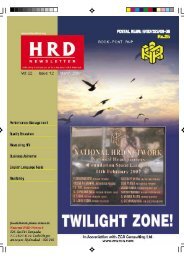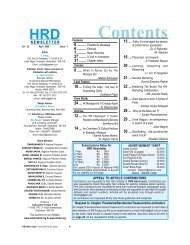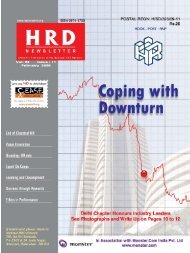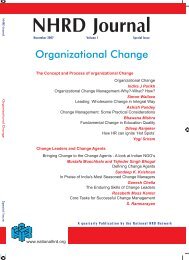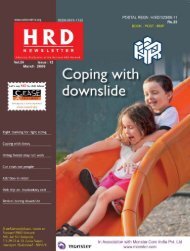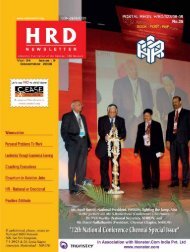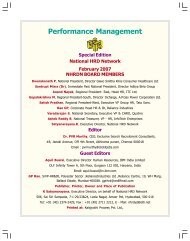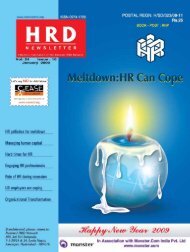Challenge for HR - National HRD Network
Challenge for HR - National HRD Network
Challenge for HR - National HRD Network
Create successful ePaper yourself
Turn your PDF publications into a flip-book with our unique Google optimized e-Paper software.
Thinking 'Integrated Space'<br />
-TQM and <strong>HR</strong>M<br />
– P. Vijayan<br />
Most often, TQM is rarely seen as an<br />
important and integral element of an<br />
organisation's Human Resource Strategy,<br />
policies, thought processes. Most often,<br />
TQM is on the agenda of Manufacturing,<br />
Operations, and Supply Chain and at times,<br />
finds its rightful place, along side Business<br />
Excellence. <strong>HR</strong> professionals tend to<br />
possess very little appreciation of this<br />
important body of knowledge and, hence,<br />
are not at the table, regarding their<br />
organisation's Quality Strategy and<br />
integrating with the People strategies and<br />
approaches.<br />
My experiences, over time, has confirmedtime<br />
and again- that breakthroughs in<br />
thinking, frameworks and in the end superior<br />
per<strong>for</strong>mance of a process, system,<br />
company, industry, country happens when<br />
two disciplines meet each other creating<br />
new and unique ' space". As an eg,<br />
Employer Branding is an important example<br />
of the coalescing of Brand Management,<br />
Communications and <strong>HR</strong>. Another example<br />
is the inter disciplinary breakthrough of IT<br />
and Medicine, where many many years<br />
back, Medical transcription became an India<br />
advantage- much be<strong>for</strong>e the '<strong>for</strong>mal<br />
outsourcing wave' became aware to most<br />
of us.<br />
I intend exploring the space where TQM<br />
interacts with <strong>HR</strong> process/system/practice<br />
and would like to share what new<br />
possibilities could emerge. I would be<br />
exploring a couple of linkages of a TQM<br />
process/principle/philosophy with a <strong>HR</strong><br />
process/system/practice. This by no means<br />
is exhaustive but should inspire you, the<br />
readers, to deep dive and explore more<br />
insights <strong>for</strong> common good of TQM and <strong>HR</strong><br />
professionals.<br />
Let us kick off the exploration with Talent<br />
Attraction, a major challenge <strong>for</strong> India Inc<br />
and even the world.<br />
What does TQM postulate on a parallel<br />
process like Customer acquisition? Isn't<br />
customer acquisition and potential<br />
employee acquisition fundamentally<br />
representing the same'process' and could<br />
learn from each other? Do we, <strong>HR</strong><br />
professionals in the recruitment and<br />
selection vertical, understand potential<br />
employee characteristics, availability pools,<br />
substitutable skills etc, as well as the<br />
organization and the Marketing/Sales<br />
professionals understand the end customer/<br />
intermediate customers? How much<br />
research do we do to test the effectiveness<br />
of our talent acquisition strategies- in terms<br />
of efficiency, effectiveness and rein<strong>for</strong>cing<br />
the employer brand? Is our potential<br />
employee search focused on the right<br />
segments of availability? Do we know,<br />
globally, the demand supply flows of skillscurrent<br />
and likely into near future? While<br />
Product Development and Marketing<br />
professionals use advanced TQM based like<br />
Quality Focus Deployment, Taguchi<br />
experiments etc, why are <strong>HR</strong> professionals<br />
not giving more care to understanding the<br />
potential employer better- in terms of<br />
psychographic profiles, motivation to work<br />
and rewards etc? Are we in sync with<br />
changing demographics and the values of<br />
the emerging work <strong>for</strong>ce?<br />
Let us look at the selection process a bit<br />
more closely. Most of us, <strong>HR</strong> professionals,<br />
tend to give search assignments and we are<br />
psychologically happier when the search<br />
firm generates quantity- a number of CV's.<br />
We believe that gives us the widest choice<br />
and hence would lead to a better shortlist<br />
<strong>for</strong> initiating the testing processes. This most<br />
often is not true at all. When you study the<br />
TQM principles, it is clear that more is not<br />
necessarily good. That is why TQM treats<br />
inventory, excess production, warehouses<br />
as waste. Inventory hides inefficiencies in<br />
the supply chain in terms of demand<br />
<strong>for</strong>ecasting, placing timely, the right orders<br />
with vendors and the latter's capability to<br />
deliver right numbers of first time right<br />
quality. Infact, Vendor Per<strong>for</strong>mance<br />
Improvement programmes almost always<br />
are accompanied with dramatic reduction<br />
in inventories, warehouses and even the<br />
ratio of vendors to components. Then, why<br />
are <strong>HR</strong> professionals, and even Line<br />
Managers, insisting on number of cv's? Why<br />
do we not transfer accountability to the<br />
search partner to do the funneling in from<br />
many to a few and we spend more time on<br />
the few candidates??? Seems elementary,<br />
however not experienced in practice.<br />
TQM has at its corner stone, the satisfaction<br />
of the customer. Whatever is done in an<br />
organization- big or small- has to result in<br />
customer satisfaction/delight, leading to<br />
loyalty which in turn leads to the<br />
organization succeeding more, vis a vis<br />
other stakeholders. In the same vein, very<br />
few organizations have the courage to<br />
measure employee satisfaction and even<br />
fewer who are ready to see employee<br />
satisfaction as one of the most important<br />
indicators of organisational success,<br />
alongside customer and financial success.<br />
Many companies conduct employee<br />
satisfaction studies but the action planning<br />
of the outcomes are weak and sporadic.<br />
There is a tendency of many organization's<br />
to believe that employee satisfaction<br />
improvement is the baby of the <strong>HR</strong>D<br />
department while on the other hand, the<br />
entire organization -rightfully so- is involved<br />
in enhancing satisfaction of the external<br />
customer. How can not so satisfied<br />
employees continue to add value towards<br />
enhancing customer satisfaction?<br />
Staying with employee satisfaction, I have<br />
observed that there is a gap between what<br />
the senior leaders of a company wants/feels<br />
is necessary to improve employee<br />
satisfaction and the 'real' need of the<br />
employee. There is still the tendency <strong>for</strong><br />
thinking on ' we exactly know what the<br />
employees want and what we should give/<br />
not give." For egg, if the employee<br />
satisfaction scores around reward and<br />
recognition are low, the typical responses<br />
would be from the following set of<br />
diagnostics- market benchmarking tells us<br />
that we are paying one of the highest and/<br />
or employees will never be happy with<br />
whatever salary and benefits that we offer<br />
etc. The 'real' voice may not be around<br />
quantum of reward but around the process,<br />
criteria, 'employee experiencies' in terms of<br />
his/her voices are being factored into Policy<br />
and programmes. The point I am trying to<br />
make is that we, <strong>HR</strong> professionals tend to<br />
over simplify when not appropriate and<br />
complicate when not needed. The one size<br />
Contd.. On page 20<br />
P. Vijayan, he can be reached at E-mail: latika_vijayan@yahoo.com and vijayan.p@mahindra.com<br />
| <strong>HR</strong>D News Letter | December 2007, Vol.23, Issue:9 21 |



